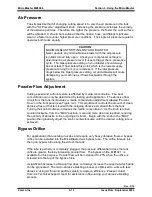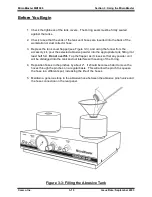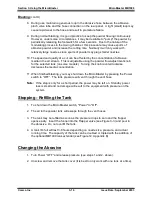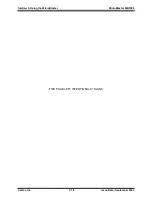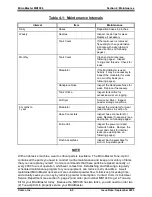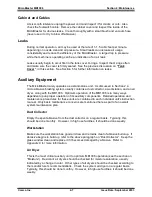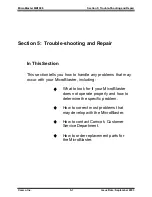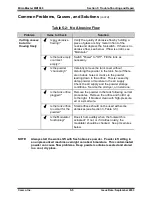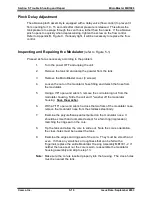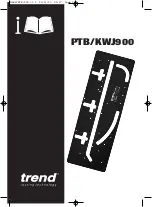
MicroBlaster MB1006
Section 4: Maintenance
Comco Inc.
4-7
Issue Date: September 2003
Cabinet and Cables
At six-month intervals, unplug the power cord and inspect it for cracks or cuts. Also
check the footswitch cable. Remove the cabinet cover and inspect the inside of the
MicroBlaster for obvious leaks. Clean thoroughly with a small brush and vacuum hose
(never use air or try to blow off abrasive).
Leaks
During normal operation, air may be used at the rate of 1-1.5 cubic feet per minute,
depending on nozzle size and air pressure. Small leaks can increase air usage
considerably and reduce the efficiency of the MicroBlaster. A large drop in pressure
while the machine is operating can be an indication of an air leak.
Leaks usually begin to occur first in the tank cover O-rings. Inspect the O-rings often
and make sure the cover is firmly sealed. See the previous discussion on
“Tank
Cover
”
, in this section. See Section 5 for further information on leaks.
Auxiliary Equipment
The MicroBlaster rarely operates as a stand-alone unit. As discussed in Section 2, a
micro-abrasive blasting system usually contains a dust collector, a workstation, and an air
dryer, along with the MB1006. Optimum operation of the MB1006 is in many ways
dependent upon proper operation of its auxiliary components. Detailed operation and
maintenance procedures for these units are contained
in each individual unit’s instruction
manual. Only basic maintenance concerns are mentioned here as part of an overall
system maintenance plan.
Dust Collector
Empty the spent abrasive from the dust collector on a regular basis. Typically, this
should be done monthly. However, in high use facilities, it should be done weekly.
Workstation
Make sure the workstation has good air draw and remains clear of abrasive build-up. If
abrasive begins to build up, refer to the above paragraph on “Dust Collector”. Keep the
glass window clean and replace it if it becomes damaged by abrasive. Refer to
Appendix C for more information.
Air Dryer
This is the most critical auxiliary unit to optimum MB1006 operation (see the section on
“Moisture”). Desiccant air dryers should be checked for moisture saturation, usually
indicated by a change in color. Other types of air dryers should be checked according to
the manufacturer’s recommendations. Check the system air dryer on a regular basis.
Typically, this should be done monthly. However, in high use facilities, it should be done
weekly.
Summary of Contents for MicroBlaster MB1006
Page 10: ......

